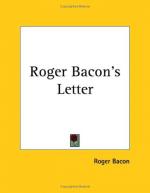|
This section contains 845 words (approx. 3 pages at 300 words per page) |

|
SOURCE: "Philosophy in Thirteenth Century Christendom," in A Short History of Medieval Philosophy, Princeton University Press, 1964, pp. 157-81.
In the following excerpt, Weinberg succinctly summarizes Bacon's philosophy and its significance.
In his Opus Majus, a lengthy exposition of the need to improve philosophical study, Roger Bacon (born about 1214 or a little later; died after 1292) expresses points of view which link him to Avicenna and the older Augustinian doctrines and at the same time reveal his intense interest in the development of mathematics and experimental science.
The eternal light of Wisdom, he tells us, directs the Church, regulates the Commonwealth of the Faithful, brings about the conversion of infidels, and curbs evil men. But many things prevent men from receiving the benefits of divine Wisdom. There are four such hindrances to understanding: following unsuited authority, the bad effects of custom, the acceptance of the opinions of the uninformed masses...
|
This section contains 845 words (approx. 3 pages at 300 words per page) |

|


